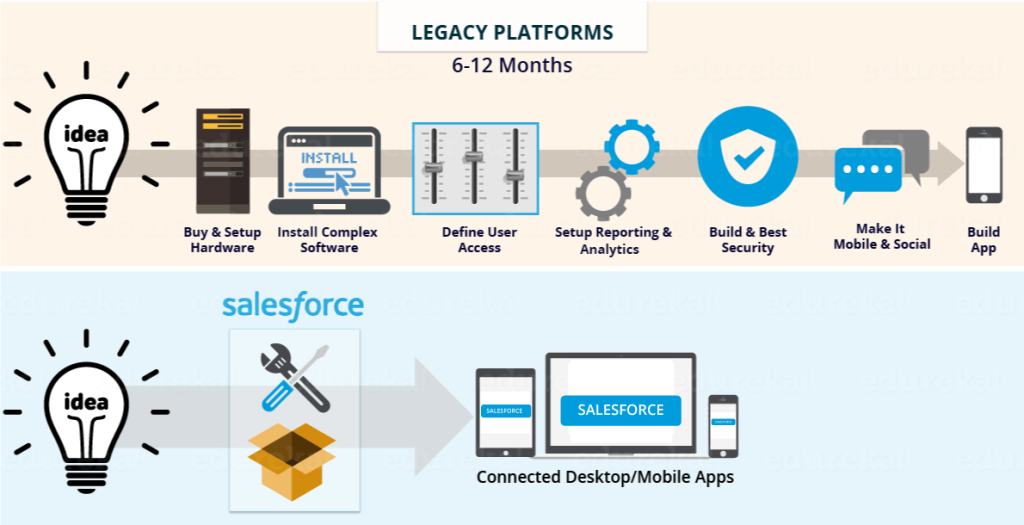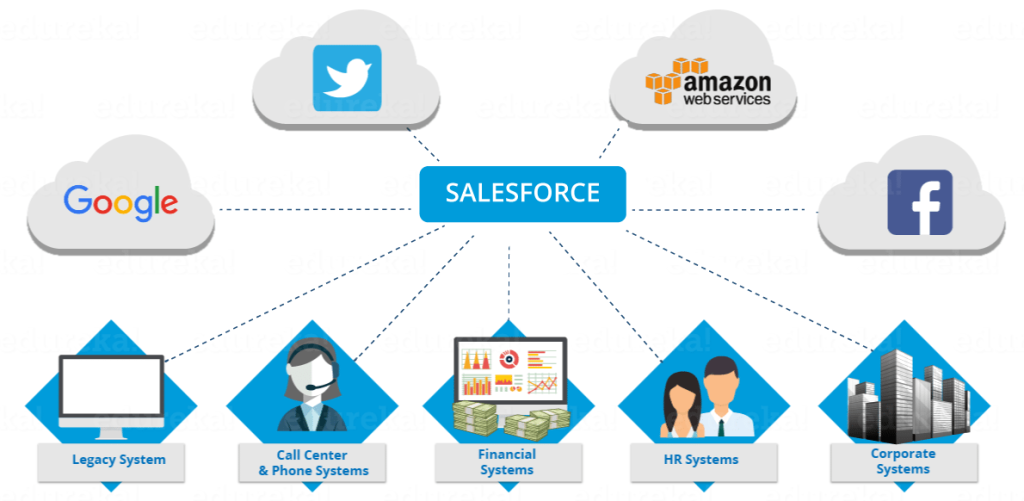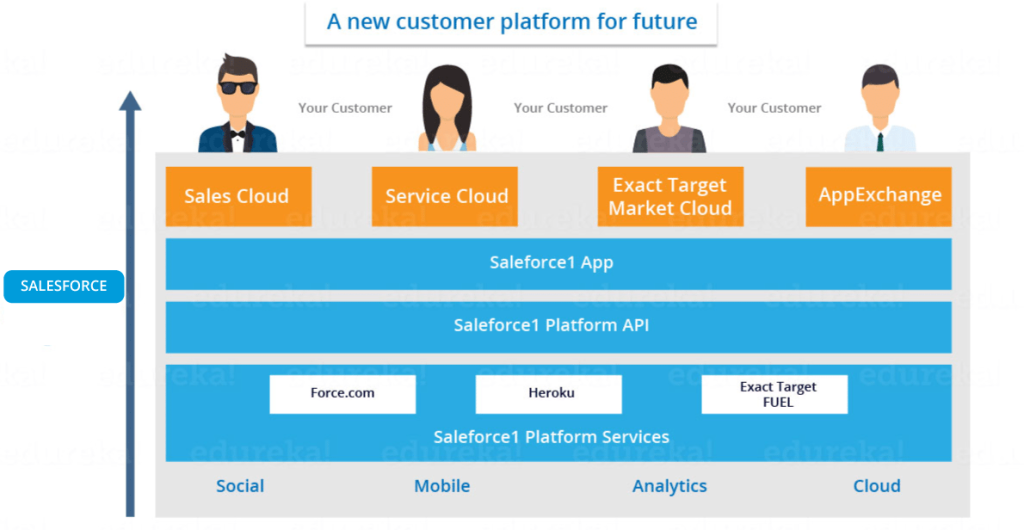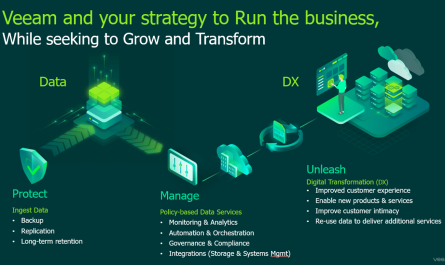In recent years, there has been a big surge in Cloud Computing Technologies. One such technology which has had an immense impact on the world of computing is Salesforce. In this blog, I will introduce you to Salesforce and will answer following questions:
- What is Salesforce?
- Why use Salesforce?
- Where is Salesforce being utilized?
- Why companies are looking for professionals with Salesforce Certification?
How It All Began?
Before Salesforce, Customer Relationship Management (CRM) solutions were hosted on a company’s own server. Can you imagine the cost and time it took for companies to have their own CRM solutions? Well, it used to take months or even years to set it up and the cost went up to millions of dollars. Even after setting up, they were extremely hard to use. What would be a feasible solution to this? I am sure you guessed it – building an affordable CRM software and delivering it entirely online as a service. This was the main idea behind Salesforce. Started as a Software as a Service (SaaS) company, it has grown into the fifth-largest software company in the world.
Check out the Salesforce Tutorial for more!
What Made Salesforce An Instant Hit?
The answer to this is very simple, it was Cloud Computing. Salesforce wasn’t just about a better product at a fraction of the cost. It was about replacing the lengthy installation process and moving everything to the internet. They changed the business model – no more long-term contracts or expensive licensing deals, anyone could use Salesforce with only a simple 50-dollar monthly subscription fee. Learn why Salesforce is the top cloud computing company here!

Benefits of salesforce:
- As seen in the above image, Salesforce CRM provides you with the fastest path from Idea to App. You can concentrate on building your app using this tools, rather than building the infrastructure and tools yourself. This can save you years of time and millions of dollars.
- Salesforce customers generally say that it’s unique for three major reasons:
- Fast – Traditional CRM software can take more than a year to deploy, compare that to months or even weeks with Salesforce.
- Easy – Salesforce wins in the easy to use category hands down. You can spend more time putting it to use and less time figuring it out.
- Effective – Because it is easy to use and can be customized to meet business needs, customers find Salesforce very effective.
- Salesforce is in the cloud, so your team can use it from anywhere with access to the internet.
- If you are a business that is rapidly changing or you are a seasoned company that’s been around for years, your business is probably changing too. Salesforce is completely scalable to your growth.
- Salesforce seamlessly integrates with 3rd party apps. If you want to integrate Salesforce with Gmail you can do it, if you want to integrate it with your accounting software you can do that too. On the other hand, integration is tough with other CRMs.
- Salesforce is affordable, especially if you consider its vast variety of capabilities. Even startups and small business can use Salesforce.
Statistics which make you choose Salesforce
As of May 2016, Salesforce has had over 150,000 customers across the world. In the world of CRM, Salesforce dominates with a 19.7% market share. Its closest competitors SAP (12.1%), Oracle (9.1%) and Microsoft (6.2%) are far behind. The Salesforce AppExchange features over 2,700 applications which has driven a total of over 3 million installations and more than 70% of Salesforce customers use applications that are listed on the AppExchange. Today, many companies are developing their applications on Salesforce platform or are migrating to Salesforce. This has increased the demand for Salesforce developers and administrators. Currently, Salesforce Architect is one of the hottest skills to have on a tech resume and enrolling for Salesforce PD1 certification is the right time.
“Salesforce Architect has the highest average salary across the most valuable job skills.” – Business Insider

What Is Salesforce?
I hope I have answered your question on why you should choose Salesforce. Now, let me introduce you to Salesforce and answer the question on your mind: What is Salesforce? Below is an image which shows the power of Salesforce in today’s tech-savvy world. From tech giants like Google and Facebook to your nearby call center, all of them use Salesforce services and products to solve their problems.

Salesforce started as Software as a Service (SaaS) CRM company. Salesforce now provides various software solutions and a platform for users and developers to develop and distribute custom software. Salesforce.com is based on multi-tenant architecture. This means that multiple customers share common technology and all run on the latest release. You don’t have to worry about the application or infrastructure upgrades – they happen automatically. This helps your organization focus on innovation rather than managing technology. Enroll in Salesforce architect certification program to become the master.
What Are The Services And Products That Salesforce Offers?
To understand what is Salesforce, you need to know the different services and products that Salesforce has to offer and when to use them. Through Salesforce, you can access a wide range of products and services in Cloud, Social and Mobile domains. Below is an image that shows the different services and products that Salesforce offers to its customers.

The Cloud Services That Are Offered By Salesforce Are:

Salesforce Sales Cloud – The Sales Cloud is a CRM platform that enables you to manage your organization’s sales, marketing and customer support facets. If your company is engaged in business-to-business (B2B) and business-to-customer (B2C), then sales cloud is the service your sales team needs.

Salesforce Marketing Cloud – The Salesforce marketing cloud provides you with one of the world’s most powerful digital marketing platforms. The marketers in your organisation can use it to manage customer journey, email, mobile, social media, web personalization, content creation, content management and data analytics.

Salesforce Service Cloud – The Service Cloud is a service platform for your organization’s customer service and support team. It provides features like case tracking and social networking plug-in for conversation and analytics. This not only helps your agents to solve customer problems faster, but also gives your customers access to answers. Using these answers your customers can solve problems on their own.

Salesforce Community Cloud – If you need a social platform for your organization to connect and facilitate communication among your employees, partners and customers then Salesforce Community Cloud is the service you need. You can use this platform to exchange data and images in real time.

Salesforce Commerce Cloud – The commerce cloud enables your organization to provide seamless customer service and experience irrespective of your customer’s location (online or in-store). It also provides for customer data integration so that your consumers can have a better experience. If your goal is to provide customer with a positive, engaging customer experience, Commerce Cloud is the service you need.

Salesforce Analytics Cloud – The Analytics Cloud provides a business intelligence platform for your organization to work with large data files, create graphs, charts and other pictorial representations of data. It is optimized for mobile access and data visualization and can be integrated with other Salesforce clouds.

Salesforce App Cloud – To develop custom apps that will run on the Salesforce platform, you can use the Salesforce App Cloud. It provides you with a collection of development tools that you can utilize to create custom applications. Some of the tools in the App Cloud include:
- Force.com, allows admins and developers to create websites and applications into the main Salesforce.com application.
- AppExchange is an online application marketplace for third-party applications that run on the Force.com platform.
- Heroku Enterprise gives developers the flexibility to create apps using their preferred languages and tools.
- Salesforce Thunder is big data and rules processing engine designed to analyze events and take personalized actions.
- Salesforce Sandbox allows developers to test ideas in a safe and isolated development environment.

Salesforce IoT Cloud – When your organization needs to store and process Internet of Things (IoT) data, you can utilize the service of Salesforce IoT cloud. The platform is built to take in massive volumes of data generated by devices, sensors, websites, applications, customers and partners. On receiving this data, the platform initiates actions to give you real time responses.

Salesforce Health Cloud – If you are a Health IT organization and require a CRM system that incorporates doctor-patient relationship and record management, then Health Cloud is what you need. Through the patient profile you can support one-to-one relationship by integrating information from multiple data sources.
Other Services That Are Offered By Salesforce Are:

Chatter – Chatter is an enterprise collaboration platform from Salesforce that enables your employees to collaborate. Chatter can help you drive productivity by connecting employees wherever they are. It also helps in knowledge sharing between departments in an organization or different organizations.

Salesforce1 – Salesforce1 is the platform which enables you to develop application and exchange data via Application Programming Interface (APIs). APIs refer to prebuilt programming code components.
Which Companies Use Salesforce?
Now that we have a clear understanding of what is Salesforce and which service to use when, let’s look at where Salesforce is being used by various companies across different industries.
| Industry | Company | Case |
| Communications | Comcast-Spectator | Comcast-Spectator used Salesforce to maintain detailed customer profiles so that they can identify their biggest fans and market more effectively to them. |
| Financial Services | American Express | American Express started to use Salesforce Sales Cloud in 2010. Now, they have their customer success platform on Salesforce, which connects thousands of employees across organizations, locations and time zones. |
| Government | Obama for America | Staff of Obama for America used Salesforce Service Cloud to send personalized emails to users. They also used dashboards to get real-time read on what the nation was thinking about and where opinions differed across the country. |
| Health Care | Health Leads | With Salesforce Community Cloud, Health Leads are leading the way to a new model for healthcare. Also, with Salesforce App Cloud, they can easily view and update patient data, coordinate with physicians and find effective community resources. |
| High Tech | Sony | Sony uses Salesforce Service Cloud to tune in with its customers. Sony’s customer cases are managed as one unified agent experience which has helped them to keep their customers happy. |
| Media | Coco-Cola Enterprise (CCE) | CCE uses Salesforce across multiple geographies and multiple business functions. From call center agent to service technicians and sales representative, Salesforce is being used to connect people and information. This has helped CCE to deliver a better customer experience. |
| Manufacture | InMobi | InMobi swapped out several CRM systems for the Salesforce Sales Cloud. Salesforce has enabled InMobi to run a single layer of data management through the company. This has made InMobi a fast and efficient company. |
| Retail | Trip A Deal | Trip A Deal’s Heroku based cloud platform application was designed and deployed in under five weeks. This delivered critical advantages to the start up business including system stability and cost effective scalability. |
Salesforce Use Case
We have seen above how different companies are using Salesforce to solve problems and improve productivity. Now, let’s look at how Hindustan Computer Limited (HCL) utilized Salesforce to solve its business challenges.
- HCL wanted to cater to the changing business requirements. To solve this problem, HCL wanted to implement, integrate and migrate to a new sales force application (SFA – software that automates business tasks) from their previous .NET SFA.
- HCL wanted to overcome the challenges of data redundancy and inconsistency caused by multiple applications.
To solve these business challenges HCL chose to implement SFA using Salesforce.com. HCL evaluated Salesforce and found that it met their requirements in regard to security, governance, collaboration and integration with third party applications.

The above image shows the different modules that were implemented to solve the challenges. Below I have explained these modules in detail.
Lead Management Module – HCL used the Salesforce standard solution for lead capturing and assignment, lead qualification and conversion. They developed a custom solution for capturing leads from external sources and screening leads to prevent duplication.Account Management Module – HCL used the Salesforce standard account management module and implemented a custom solution for defining business logic for real-time search for customer accounts, manage the flow of data and manage daily batch updates.
Contact Management Module – HCL used the Salesforce standard contact management module including activity management and implemented a custom solution for managing flow of data after account conversion.
Opportunity Management Module – HCL used the standard Salesforce opportunity module and developed a custom solution for adding products to opportunity, enabling manual product pricing and for creating discount approvals on opportunity product.
Integration With Other Applications – Salesforce was integrated with applications such as SAP, ODS, BI, and various third-party applications by using AppExchange applications and customized Web Service APIs.
HCL implemented the Salesforce1 Sales Cloud in four months with 92% user adoption. Four months is quick for a program that impacted over 6,200 users across 14 countries. Ease of integration with third-party applications improved productivity by 3-4 percent. Using Salesforce, HCL was able to validate data at the time of data entry, enabling them to achieve an incredible 90% accuracy in their master data.



